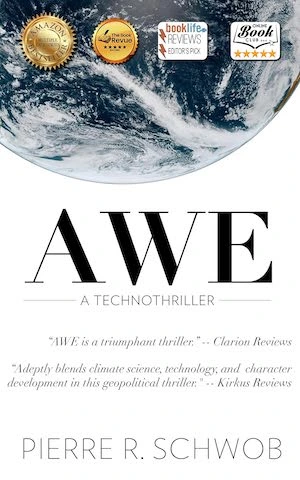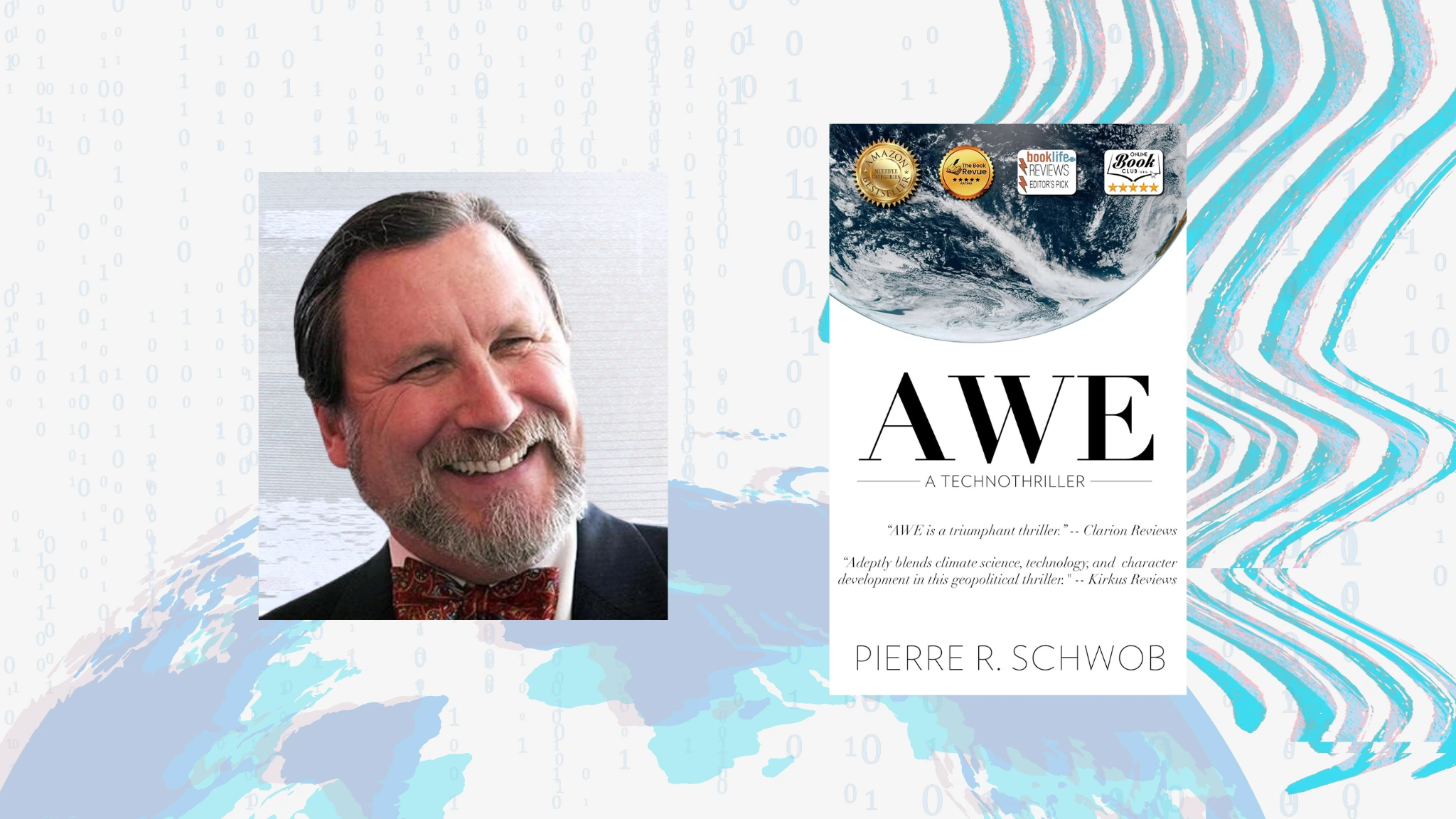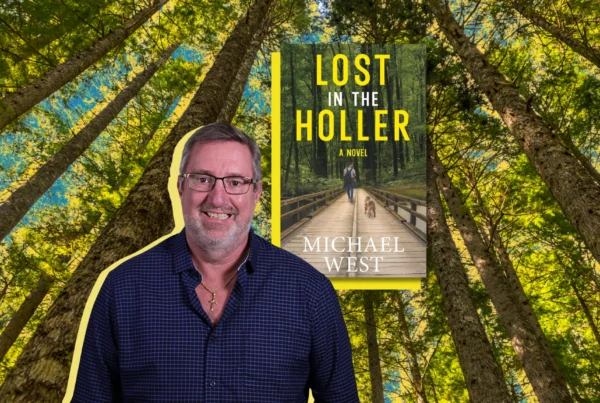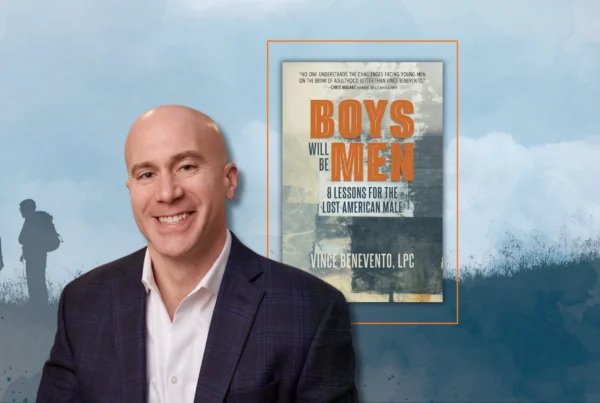AWE: A Technothriller by Pierre R. Schwob
‘In liberty and justice for all,’ has been perverted to mean, ‘for ME!’ We will have to find ways to steer this country away from such self-absorption and back to truly mean, ‘For All!’”
Those are the words of one of the key characters in the, well, awe-inspiring book, AWE, a new technothriller by Pierre R. Schwob that presents us with an intriguing storyline and at the same time tackles some heady subjects.
AWE, which stands for the Artificial Wisdom Engine, is developed by the book’s heroes to avert a catastrophic tipping point predicted by a climate model. AWE must also combat pernicious disinformation, particularly the virulent fake news generated by an industrialist — a psychopathic and murderous antagonist linked to Putin, who is determined to protect his and his clients’ interests.
BookTrib had the chance to probe further into the author’s intricate story and its themes in this recent interview.
Q: When did you come up with the idea behind AWE?
A: Although my answer will offend some, I must say that the original idea for this storyline was developed when we observed the deplorable response to COVID-19 from a previous administration, its reckless lack of interest in climate change and the self-sabotaging Department of Justice’s China Initiative, thankfully ended, but now again rearing its ugly head.
Q: AWE, the Artificial Wisdom Engine, plays a central role in combating disinformation and averting a climate catastrophe. How did you conceptualize the idea of an AI being the linchpin for global salvation, and what inspired the specific challenges AWE faces?
A: When I started to write this novel, ChatGPT and other AI engines were not yet available to the public. But AI was being used quite successfully in many areas, giving an inkling of its power but also of its dangers. I was worried that some engines were being trained on material from dubious sources, particularly social media repositories. Lack of integrity and disinformation are concerning trends.
I imagined what could come “After AI,” and the idea of building a system that would approach wisdom was not a large step. The original title of the novel was “AW,” for “Artificial Wisdom.” However, partial to “backronyms,” I found “AWE” (for “Artificial Wisdom Engine”) to be more meaningful. Once built, I imagined it would be used to detect and defeat fake news, and to act as a virtual helper in the immense effort needed to deal with the dangers of climate change.
Q: The antagonist in AWE is a psychopathic industrialist linked to Putin. What was your approach in crafting this character, and how do you see the real-world parallels influencing the narrative?
A: I am afraid that we do not have to look too far to see influential leaders who are “out of their mind!” as Kamala Harris puts it. I took a little poetic license (if that’s the word) to make my antagonist truly sinister. I borrowed his name, Olrik, to pay homage to a comic book series I read in my early teen years in Europe (check, for example, “La Marque Jaune” [“The Yellow ‘M,’” in English]. When developing this character, I had fun going back in history to see if I could make him a pal of Putin. This gave me an excuse to place Olrik as an evil disinformation genius, eventually at the head of a fossil fuel conglomerate with ties to his master and his oligarchs.
Q: International cooperation is a significant theme in AWE. How do you view the role of global collaboration in addressing climate change and disinformation?
A: International cooperation is crucial to solving the climate crisis, promoting the exchange of sound ideas, and developing the trust that will reduce the flow of disinformation. Without international collaboration humanity is doomed! I dedicated the book to the “L” variable in the Drake Equation, which is the length of time a civilization sticks around sending electromagnetic signals within the Milky Way galaxy. We should maximize “L” and not minimize it.
Q: Pic de Lucrète and Lily Lee are fascinating characters leading the charge against the impending crisis. Can you tell us more about who they are and what drives them?
A: Pic de Lucrète. Yes. I have to confess that the name “Pic,” refers to “Pic de la Mirandole” (the French name of an Italian Renaissance man reputed to know everything…). It was a moniker that one of my teachers gave me in high school. I think he meant it as a compliment. I only wish I could have followed the same arc as Pic in my own life. We have similar hobbies. Like him, I am interested in many things, except punk rock and plumbing and even the latter is intriguing. So, when developing his character, I simply wrote about a life I would have found fulfilling. I had to make him “a bit of a pedant” to bring him down a notch. I have other, much larger flaws.
Lily Lee. Ah. First, a brilliant mathematician. Balanced and drop-dead gorgeous. What’s not to like? You may know that I lived 11 years in Hong Kong and visited Beijing countless times. The China angle was there from the start.
These two characters were in my head before I began writing. I saw Pic as the driver of the great vision — with Lily complementing his intellectual horsepower while presenting a misleading sense of vulnerability. I also wanted to have a wise statesman, former SecDef Baudouin van Eyck, the head of the think tank to offer guidance and open otherwise inaccessible doors. Getting to know Bill Perry, a real sage at Stanford, was a strong inspiration.
Q: Your novel moves across diverse settings, from Silicon Valley to Moscow, Tokyo and Beijing. How did these locations influence the story?
A: I’ve traveled quite a bit, for work and for pleasure, particularly given my interest in visiting labs and observatories worldwide, and even spent some time at the South Pole. I’ve gone to Japan 42 times (commuting from Hong Kong). It was natural to bring in some of these locations and use their settings and mores to create a living environment for the story and to define some of the actors. Anchoring the protagonists’ arcs in their historical national context also supported and enriched the narrative.
As I said before, I am an ardent believer in international collaboration. Having China as one of the initial partners in joining the effort to combat climate change made eminent sense to me and hopefully to the readers.
Q: AWE addresses the intersection of technology, ethics, and global survival. What do you hope readers will take away from the story about the potential of AI, the importance of truth and the necessity of international cooperation?
A: I hope AWE will emphasize that we ignore climate change at our civilization’s peril. But to solve such global issues requires healthy mindsets: to support and respect rigorous, good science; to be discerning, to sieve and eliminate fake news; to bring wisdom and ethics to the deployment of new technologies.
I would share my conviction that we must protect freedom and democracy, reject totalitarianism and fascism at home as well as abroad. That said, we must promote the free exchange of ideas across borders without calling on national security (although entirely necessary) as a pretext to wantonly block international collaboration. As I said before, our “L” depends on this.
To close, I’ll quote Pic: “We laud this country’s exceptionalism. It was our individualism and love of freedom, entrepreneurship and can-do spirit that created the greatest wealth in the history of the world. But I am afraid that these qualities have surrendered to casual self-indulgence. During the Covid pandemic, this love of freedom was invoked by many to justify their refusal to social-distance, mask-up, or get vaccinated to protect themselves and others. The words of the Pledge of Allegiance, ‘In liberty and justice for all,’ have been perverted to mean, ‘for ME!’ We will have to find ways to steer this country away from such self-absorption and back to truly mean, ‘For All!’”
Q: Have you started on your next novel?
A: Yes. I am resisting a rest.
Pierre R. Schwob is a computer scientist who founded Classical Archives. He owns several patents — some incorporated into a U.S. radio national standard.
Published works include:
- AWE, Palo Alto, Sciences Org Books, 2024; a climate change technothriller.
- The Great Documents of the World: Milestones of Human Thought, (ed). U.S., U.K., Spain, Japan: McGraw-Hill, 1977; Austria, Germany: Kruger Verlag, 1977.
- How to Use Pocket Calculators. New York: Van Nostrand Reinhold, 1976. Special selection of the Macmillan Book Club. Introductory offer of the Library of Mathematical Sciences.
- The Chess Tutor: Opening Moves, co-authored with George F. Kane. New York: Mason/Charter, 1976.
 He wrote the libretto of the narrated symphony “Cosmic Reflection,” offering the history of the universe in 40 minutes, composed by Nolan Gasser. It premiered at the Kennedy Center for the Performing Arts in Washington DC in 2009.
He wrote the libretto of the narrated symphony “Cosmic Reflection,” offering the history of the universe in 40 minutes, composed by Nolan Gasser. It premiered at the Kennedy Center for the Performing Arts in Washington DC in 2009.
Asteroid “(32890) Schwob” is named after him. He is engaged with the latest developments in astrophysics and cosmology, particularly at Stanford/SLAC.
He regularly visits labs worldwide (including at the actual South Pole) to follow the latest physics experiments. He is a long-time director of the SETI Institute. He lives in Palo Alto, California.





